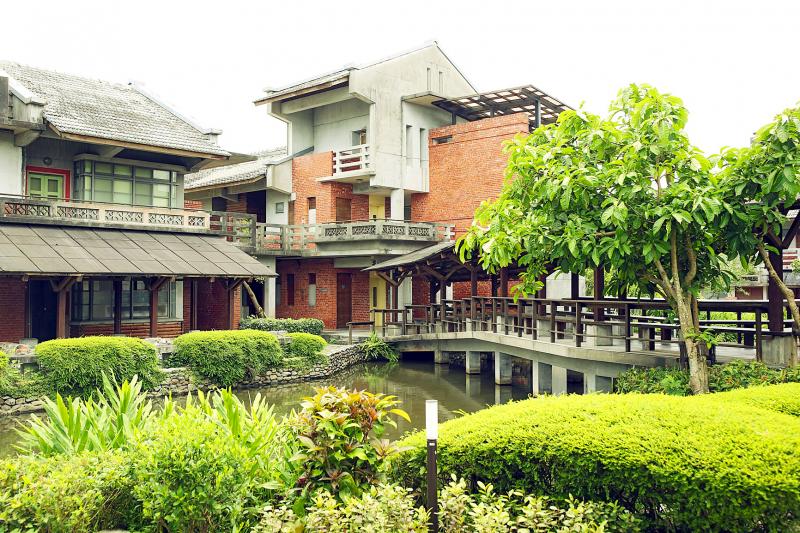Hotel Royal Group (老爺大酒店集團) is to shut down a property in Yilan County’s Wujie Township (五結) under the Place brand when its management contract expires in August, succumbing to a business freeze amid a level 3 COVID-19 alert.
The Place Yilan (宜蘭傳藝老爺行旅), which is within the National Center for Traditional Arts (宜蘭傳藝中心), is the second hotel to exit the market this year after Fullon Hotel Taipei (福容大飯店台北一館).
The Place Yilan started operations in April 2017 under a management contract with Pxmart Co Ltd (全聯實業).

Photo courtesy of The Place Yilan
The hotel’s four conference rooms, a cafe and a restaurant are to close on Aug. 22 after a ban on dine-in services and restrictions on gatherings put them in abeyance.
“We have decided not to renew the contract that is due to expire on Aug. 31 out of concern that hotel operations might not return to normalcy any time soon,” Hotel Royal Group said in a statement on Monday.
People with reservations after Aug. 31 can seek full refunds and those with hotel and restaurant vouchers can redeem at other locations, the group said.
It would help employees to find work at other properties or provide compensations in accordance with labor requirements, it said.
The hospitality industry has relied entirely on domestic tourism for the past one-and-a-half years due to lingering border controls, but domestic tourism also came to a sudden halt after authorities raised the COVID-19 alert to level 3 nationwide on May 19 to curb the spread of local infections.
The group said it would press ahead with operations at 10 other properties under the Place, Hotel Royal (老爺酒店) and Royal Inn (老爺會館) brands, and four properties in Palau, Vietnam, Mauritius and Nicaragua.
Pxmart, which has a 15-year lease from the Yilan County Government to run the cultural and recreational park, said it would look for other parties to fill the space left by The Place Yilan.

Quanta Computer Inc (廣達) chairman Barry Lam (林百里) is expected to share his views about the artificial intelligence (AI) industry’s prospects during his speech at the company’s 37th anniversary ceremony, as AI servers have become a new growth engine for the equipment manufacturing service provider. Lam’s speech is much anticipated, as Quanta has risen as one of the world’s major AI server suppliers. The company reported a 30 percent year-on-year growth in consolidated revenue to NT$1.41 trillion (US$43.35 billion) last year, thanks to fast-growing demand for servers, especially those with AI capabilities. The company told investors in November last year that

Intel Corp has named Tasha Chuang (莊蓓瑜) to lead Intel Taiwan in a bid to reinforce relations between the company and its Taiwanese partners. The appointment of Chuang as general manager for Intel Taiwan takes effect on Thursday, the firm said in a statement yesterday. Chuang is to lead her team in Taiwan to pursue product development and sales growth in an effort to reinforce the company’s ties with its partners and clients, Intel said. Chuang was previously in charge of managing Intel’s ties with leading Taiwanese PC brand Asustek Computer Inc (華碩), which included helping Asustek strengthen its global businesses, the company

Taiwanese suppliers to Taiwan Semiconductor Manufacturing Co. (TSMC, 台積電) are expected to follow the contract chipmaker’s step to invest in the US, but their relocation may be seven to eight years away, Minister of Economic Affairs J.W. Kuo (郭智輝) said yesterday. When asked by opposition Chinese Nationalist Party (KMT) Legislator Niu Hsu-ting (牛煦庭) in the legislature about growing concerns that TSMC’s huge investments in the US will prompt its suppliers to follow suit, Kuo said based on the chipmaker’s current limited production volume, it is unlikely to lead its supply chain to go there for now. “Unless TSMC completes its planned six

TikTok abounds with viral videos accusing prestigious brands of secretly manufacturing luxury goods in China so they can be sold at cut prices. However, while these “revelations” are spurious, behind them lurks a well-oiled machine for selling counterfeit goods that is making the most of the confusion surrounding trade tariffs. Chinese content creators who portray themselves as workers or subcontractors in the luxury goods business claim that Beijing has lifted confidentiality clauses on local subcontractors as a way to respond to the huge hike in customs duties imposed on China by US President Donald Trump. They say this Chinese decision, of which Agence